Disclosure: I sometimes earn products or commissions from affiliate links or partnerships on my blog. I only recommend products and services I trust to serve you. Learn more.
SUMMER 2024 UPDATE: While we are still having a great experience with our Berkey, actually obtaining one can be difficult if not impossible right now. There are many reasons for this, and I’ve written a thorough post explaining all of the issues surrounding Berkey Filters right now. I also take some time to evaluate several viable Berkey alternatives for folks looking for a high-quality countertop gravity water filter or current Berkey owners who need trustworthy replacement filters. I encourage you to go read that post HERE in addition to our original Berkey review below.
READ: What Happened to Berkey? Water Filter Options for 2024 and Beyond
If you’re looking for the best water filter for your family, there is a dizzying slew of options. From inexpensive units like Brita and Pur, to countertop gravity filters like the Berkey, to reverse osmosis systems for your whole home, it’s hard to tell what’s best.
And if you’re anything like us, you want to read as many honest reviews as possible before making an informed decision.
Back in 2018, after months of research (and frustration with our usual pitcher filter), we decided to purchase a Big Berkey Water Filter System for our off-grid home.
In this Berkey Filter review post, we’ll share our personal experiences, break down the pros and cons of a Berkey Water Filter system, and answer some common questions we get from folks looking to get the best water filter for their situation.
What is a Berkey Water Filter?
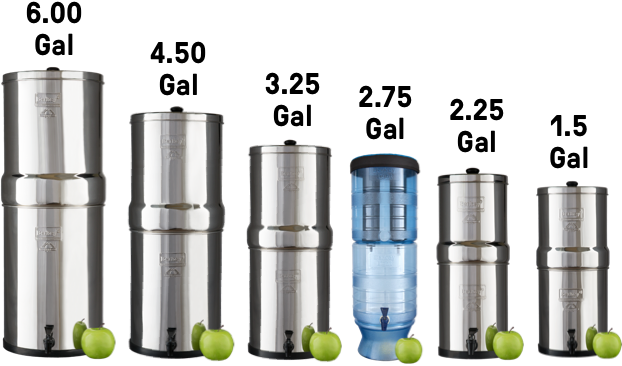
Berkey Water Filters (by New Millennium Concepts) are countertop gravity filters, meaning they use the force of gravity to feed water through the filter from the top chamber to the lower chamber. No moving parts or electricity are required, so it’s perfect for off-grid applications like ours. This also makes it perfect for emergency situations like natural disasters or in areas where access to clean local water is limited.
All models except for the Berkey Light are stainless steel construction (double bonus of less plastic AND sturdiness). It comes standard with a plastic spigot, but you can upgrade to a stainless steel spigot if you’re looking to purge as much plastic from your life as you can.
They also now have a stainless option for their Water View spigot that lets you easily check the water level in the lower chamber so you can tell if it’s time to refill or not.
Shop BigBerkeyWaterFilters.com here
How much water can it filter and what’s the flow rate?
Each set of two black filter elements can filter up to 6000 gallons of water.
We’ve found that our Big Berkey System with two of the regular black Berkey filters will process about 2 gallons in 1-2 hours. Simply pour water into the upper chamber and let it filter through to the bottom chamber. We usually make sure to fill it at night so that we wake up to a full chamber of water.
We started with the set of two black Berkey elements that come standard and later purchased an additional set of two for a total of four filters in our top chamber. This sped up our flow rate pretty dramatically to about 20-30 minutes for 2 gallons. For everyday home use, this is pretty convenient. I imagine it would be even more critical if you were using it to supply clean water to more people during an emergency situation.
If we notice the flow rate start to slow down, it’s a sign we need to clean our filters. This is a pretty easy task to do once every couple of months. If you’re filtering city water, you’ll probably have to do this far less than we do with our rainwater. We sometimes notice a light layer of “slime” on the element’s surface that tells me it’s time to clean. My mom, in the city with her Go Berkey, never gets this film.
For a family of three, we typically only fill our Big Berkey filter once or twice a day (more if it’s hot outside and we need to hydrate!).
Regular filling is important to the life of the system. It is important to keep the black Berkey purification elements moist so they don’t dry out and lose efficacy. This means that choosing the right size filter is critical — choose too large of a system for your everyday needs and you risk reducing the life of the filters.
READ: Travel Berkey? Crown Berkey? What size Berkey system should you actually choose?
What is it capable of filtering?
According to their website, the black filters are capable of removing “99.9999999% of pathogenic bacteria (log 9 reduction) and 99.999% of viruses”.
You can read more about their specs here, but the quick version is that they remove:
- Viruses: Removed to >99.999% (Log 5) MS2 Coliphage – FR Coliphage
- Pathogenic Bacteria (And Surrogates): Removed to >99.9999%
- Trihalomethanes: Removed to >99.8%
- Inorganic Minerals Chloramine; Chloride; Chlorine Residual (Total Residual Chlorine); Free Chlorine
- Heavy Metals (High & Low pH Levels) (see complete list)
- Micro-Organisms: Removed to >99.9% Including: Total Coliform, Fecal Coliform, e.Coli
- Pharmaceutical Drug Contaminants: Removed to >99.9% (see complete list)
- Pesticides & Volatile Organic Compounds: Removed to Below Lab Detectable Limits
And YES, since I’m asked a lot, it DOES REMOVE THE EGG SMELL if you have sulfur in your water.
It removes a TON of other compounds that are too lengthy to list here. Note also that it leaves in the beneficial minerals that your body needs to function properly. You can read their complete specs and see independent lab results here.
Note: We don’t have fluoride filters. You can add separate fluoride filters to your system if you desire.
Why We Chose the Big Berkey
Several years back, as my husband and I looked at the building site for our off-grid cordwood home, it became clear that we were too far from the road to reasonably connect to grid water.
Instead, we opted for rainwater catchment with a cistern. The rainwater doesn’t come in pure and clean. Even if you put in preventative measures, like first flush diverters, the water that gets to the cistern is often full of stuff you wouldn’t want to drink. Think dirt, dead bugs, bird droppings, and the microorganisms that accompany all that.
With a small child in the house, I didn’t want to take any chances.
We have a whole-house two-stage particulate filter that removes the dirt and such from the water as it enters the house, but what about the microorganisms that make it past the filter?
Our First Filter (before the Berkey)
I also hate spending money, and a Berkey seemed like a big investment at the time. So as I was walking around a big box store one day I saw the Pur MaxION. I looked it up and it said it was supposed to remove microbial cysts. Since it was only $25 I gave it a shot.
Wow was that a mistake!
In theory, the Pur should be fine for municipal water, but when you’re dependent on a filter to make your cistern or well water safe its performance is extra important. I didn’t have any real guarantees that it would remove the smaller pathogens I was worried about, so I usually boiled my water just to be safe.
Beyond that, it filtered SOOOOOO SLOWLY. I could fill it at night and it would only have filtered a few cups by morning. A cursory search showed this to be a common issue because the top chamber would seal itself shut and prevent water from flowing through.
I couldn’t guarantee I’d have enough fresh drinking water on demand to meet our needs, so I ended up supplementing with gallons of bottled water from the grocery store. If you’ve followed me at all, you know how much I HATE PLASTIC, so this was a purchase I loathed making.
I knew there had to be something better, so I researched.
Searching for options
There are several different options out there, including the Propur Big and Alexapure Pro. I even looked to see if I could rig up a LifeStraw Family filter for kitchen use, but ultimately chose the Big Berkey because:
- It has a lifetime warranty.
- Two-year warranty on the black filter elements
- Stainless steel construction
- Minimal plastic components
- A long track record of success in the off-grid community
- Awesome customer service…seriously some of the nicest people I’ve ever dealt with!
The Big Berkey also has a good capacity for us as a family of 3. Even if we have guests over, it’s not too hard to filter several pitchers of water to have on hand since it filters so quickly compared to any of the store-bought filters we’ve had over the years.
There is a pretty wide variety of sizes to choose from, which accommodate different sized households or usage situations (i.e. it’s in a B&B, faculty lounge, emergency center, etc.). Read this post to learn how to choose the right size Berkey for you.
How does the water taste?
I didn’t think I was a water snob before I had a Berkey. I’d see memes and threads of my friends talking, throwing shade at Dasani water for some reason. I was always perplexed because all bottled water tastes about the same to me and I wasn’t fussed about any of it. Water was water. Or so I thought.
The purified water you get out of a Berkey is so refreshing it has ruined me for most other water. Most regular tap water has an over-chlorinated taste I didn’t realize was there until I started drinking water filtered through a Berkey. And that isn’t just speaking to our unchlorinated cistern water — it is also true of the city water through my mom’s Berkey.
And since the filters don’t remove the minerals your body needs, the taste has depth to it. It is NOT like distilled water, which lacks essential elements like magnesium and sodium.
How is a Berkey better or different from those filters you get at the grocery store?
For starters, the little Brita or Pur filters you get at the store don’t remove harmful pathogens, nor do they completely remove many of the herbicides, pesticides, pharmaceuticals, and other harmful contaminants that the Berkey does (though to their credit, they have improved at removing lead in the years since I first wrote this review).
You can get all of the info and see various side-by-side comparisons via this page.
Cost Comparisons
Not only are the Berkey filters better at removing contaminants, but they also cost WAY less over time than store filters.
Sure, it costs more upfront to buy a Berkey system, but when you run the numbers the lifetime savings are staggeringly obvious. Let’s compare:
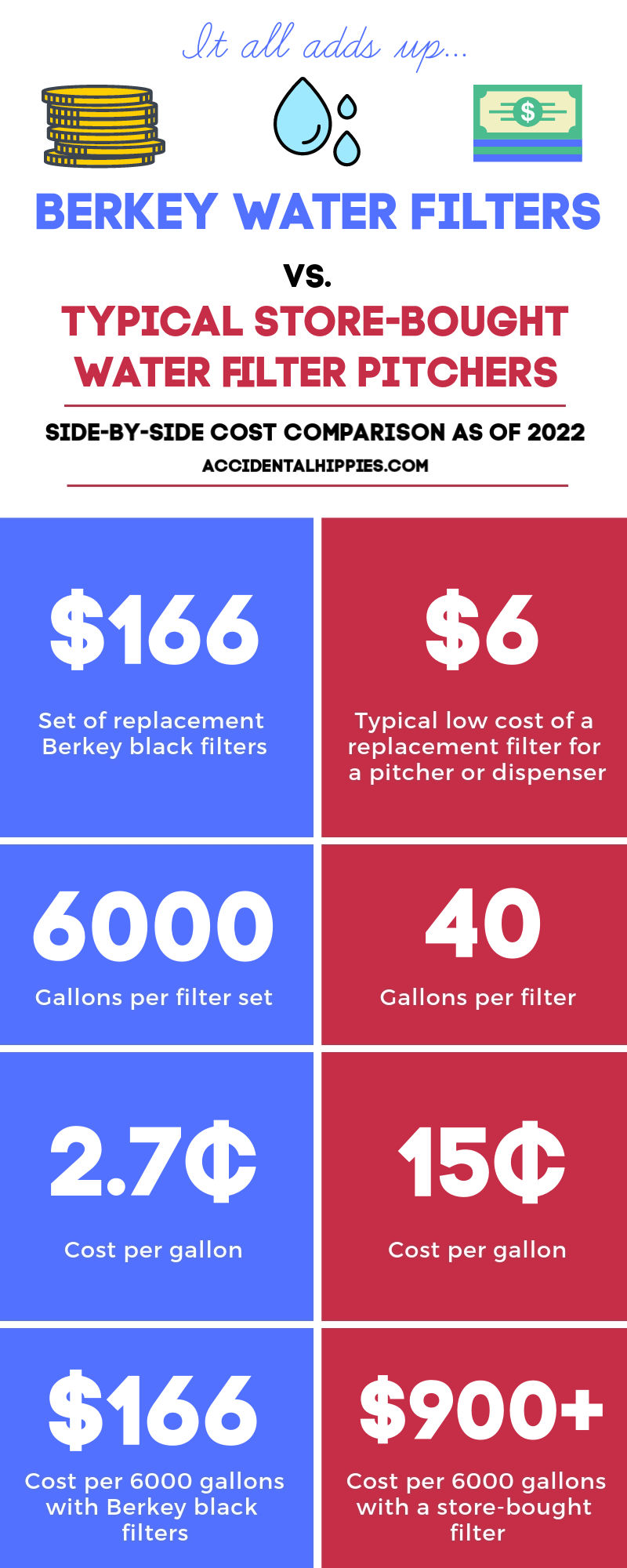
And $900 is on the LOW end of prices, considering what I usually see 3-packs of plastic filters going for at the grocery store or on Amazon. Paying 9 times the money for vastly inferior water and way more plastic waste? No thanks.
Ready to take the plunge? Find your Berkey Filter here
How Our Family Uses the Big Berkey
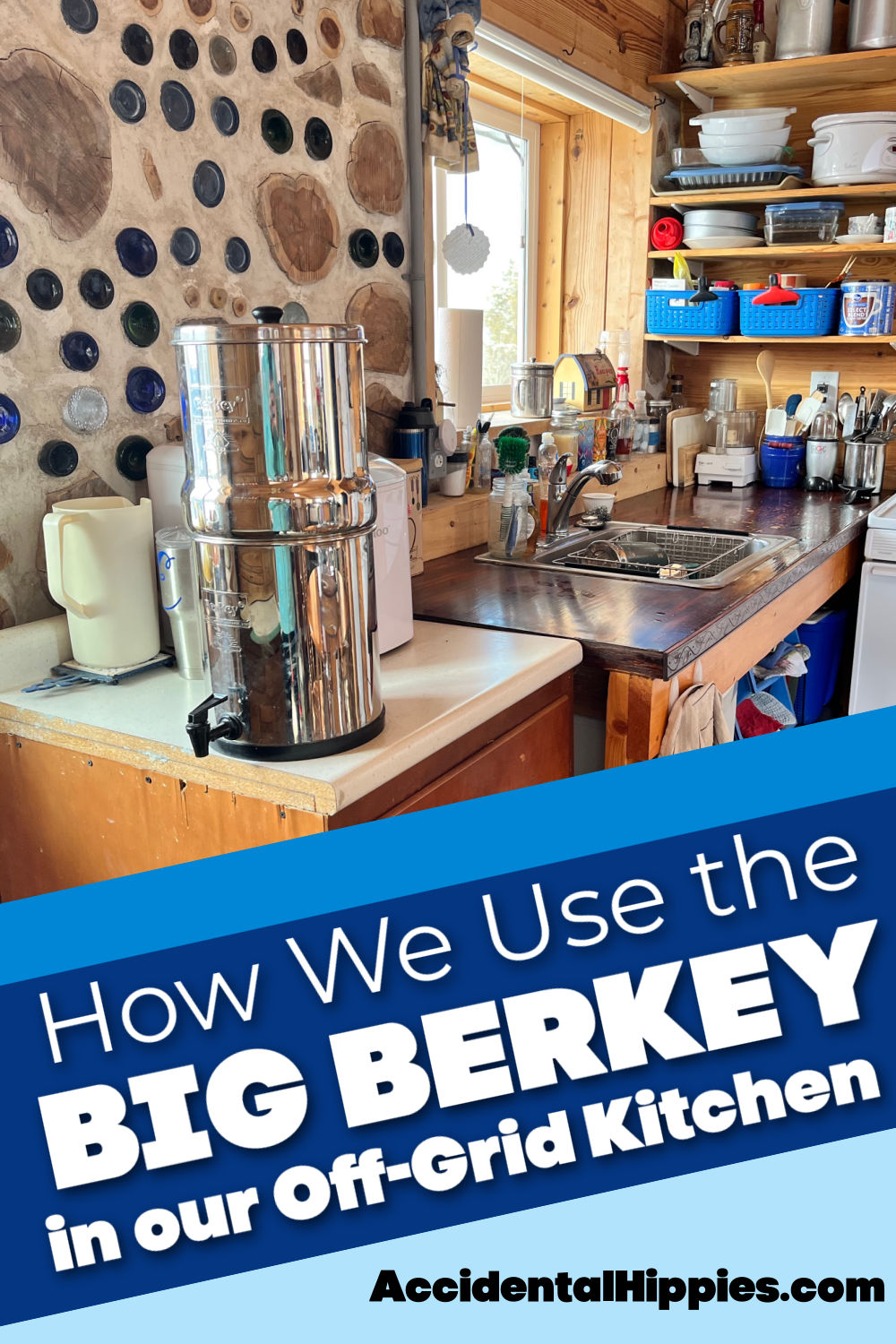
Our household consists of myself, my husband, and our young son. Since we live off the grid, our water comes out of our concrete cistern that collects rainwater from our metal roof. We typically refill our Berkey each night before going to bed and wake up to 2.5 gallons of fresh filtered water. The water is ready to drink and doesn’t require additional boiling to get rid of any pathogens that might be lurking.
During the fall, winter, and spring, the capacity of the Big Berkey gives us more than enough water for our daily drinking needs. We make coffee and tea with it every day and drink straight out of the Berkey for all other drinks. We don’t keep soft drinks around and rarely have juice, so it’s mostly water around here.
During the summer we drink a LOT of water, especially since our cordwood home didn’t originally have air conditioning (Update 2021: we DO have A/C off the grid now!), so I’ll often refill it two or even three times in a single day if we’re home and drinking a lot of water.
Aside from drinking the water, we also keep a bottle of water in our bathroom for brushing teeth. We pour a bit of water into a cup for wetting the brush and rinsing. This practice also saves us a TON of water versus running the faucet.
Additionally, for a while, I kept a spare bottle of Berkey water/apple cider vinegar in the bathroom for rinsing my hair, since the cistern water made my hair feel kind of greasy no matter what I did. I have since discovered some amazing shampoo bars from Tangie that totally eliminate this problem for me.
Berkey makes a filtering shower head but I haven’t tried it out yet. Perhaps in the future, but for now we’re happy with what we have.
Is there anything we DON’T like about the Berkey?
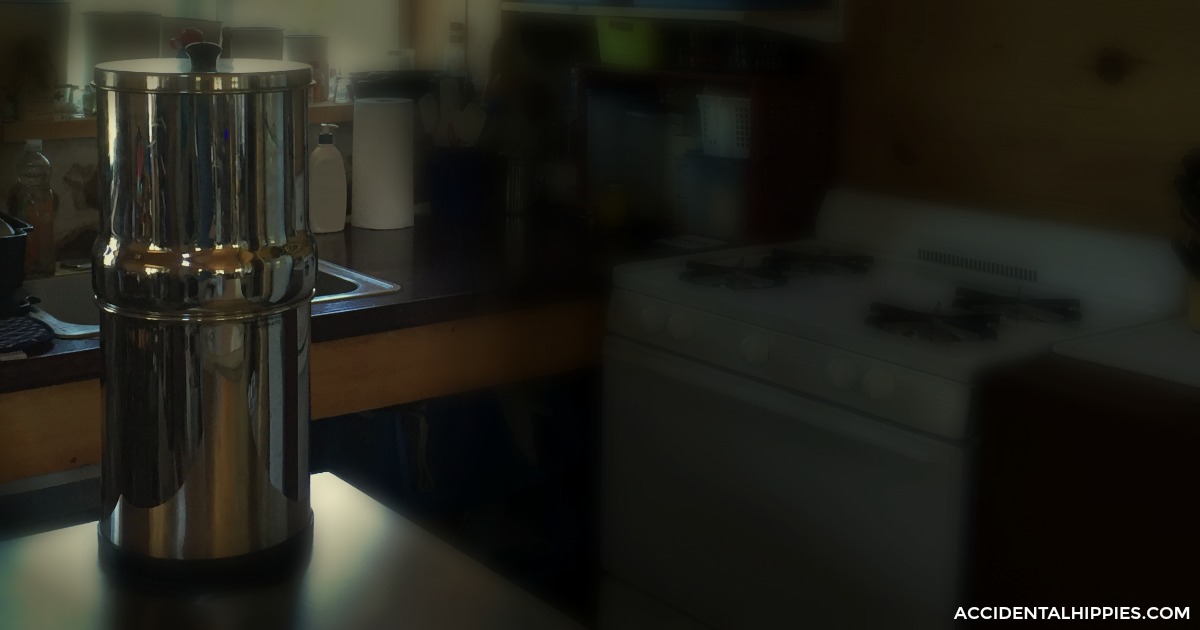
Not really, but there are some things to know.
It does require about a square foot of counter space, which can be a problem in tiny kitchens. Berkeys are also fairly tall, so you need to have a place to put it where it has enough vertical space (i.e. it’s hard to fit it under most upper cabinets).
It also requires a bit more in terms of setup and upkeep, but don’t read that to mean it takes a lot of work.
When you first get your filters, they require priming, which basically means pushing water through the pores of the filter and hydrating the elements. Depending on the package you choose, you should receive everything you need to prime your black filter elements effectively.
We opted to get this Black Berkey Primer since we don’t trust our cistern tapwater for priming purposes. I typically use any clean Berkey water we have on hand or bottled water when we prime new filters or reprime old ones from storage or cleaning.
We clean out the chambers every month and clean off the filters every 3-6 months or so. Aside from that, if we go out of town for longer than 5 days we make sure to follow the instructions for storing, cleaning, and re-priming the Berkey black filter elements when we get back.
FOLLOW THE INSTRUCTIONS IN THE MANUAL AND YOU WILL BE FINE. You’ll have gallons of water and peace of mind for years to come!
That’s it though! A bit more work than simply soaking one of those store filters in a glass of water before use, but nothing I’d call difficult. Any kind of home system that is of higher quality will require a bit more thought than a cheap solution will. It’s totally worth it for us in the long run in our off-grid home.
Is a Berkey right for your family?
Maybe, maybe not. I’m obviously pretty in love with ours and will shout it from the rooftops, but that doesn’t make it right for all families.
If you have a reliable and safe source of city water, you’re probably okay with a standard filter or perhaps nothing at all.
But if you fit any of the following:
- Have a questionable city water source
- Experience frequent boil water advisories
- Are in an area with known lead issues in the water
- Are in an area that may be serviced by lead pipes
- Are on well water
- Have a cistern (even if you haul city water)
- Catch rainwater for consumption in the home
- Already use a store-bought filter pitcher or faucet mount and want to reduce costs
- Frequently spend money on bottled water in any quantity
- Want to have a source of safe water in a grid-down situation
Then I would HIGHLY suggest getting a Berkey filter for your home. The taste is amazing, the lifetime cost is outrageously low, and the security of having safe drinking water is completely worth the hype.
If you’re considering getting a Berkey for your family, read this post about how to choose the right size to get the best deal for your unique family.
Additionally, I take time every year to analyze their holiday sales to break down the best deals (and tell you which ones you can skip). Check that out HERE.
Where can I find a Berkey?
The best way to get a Berkey filter is directly from an authorized dealer. You can be assured you’re getting a genuine unit with all the appropriate warranties and customer service.
I currently recommend Big Berkey Water Filters and Lehman’s as preferred dealers. I had to rush order new black filters in October 2023 after I had accidentally ruined mine while we were away on a long trip (I followed the storage directions but, alas, my fridge decided to freeze them in our absence) and Big Berkey Water Filters came to the rescue! Lehman’s was out of stock then, and BBWF got me authentic, watermarked filters in a matter of days.
Similarly, I have purchased many items for our off-grid home through Lehman’s and always have a great experience with them.
Buy at Big Berkey Water Filters HERE
You can also buy them on Amazon, which can be helpful if you have a gift card or if Amazon has something you want that isn’t in stock on the regular website.
I confess though, that I’m hesitant to purchase something like this from Amazon because of the prevalence of counterfeit goods. I’ve also noticed that the filter systems and accessories tend to be more expensive on Amazon.
I also like having a record of my purchase with a certified distributor in case I need to take care of something regarding the warranty (which I did once, and I was glad to have my original purchase documented there).
It’s good to have the option though.
Questions? Connect with us!
You can find out more about our off-grid cordwood homestead project here. Be sure to follow us for all kinds of homesteading goodness on Facebook, Instagram, and Pinterest!
And if building your own off-grid homestead is on your bucket list, download this handy checklist to see how ready you might be to get started.
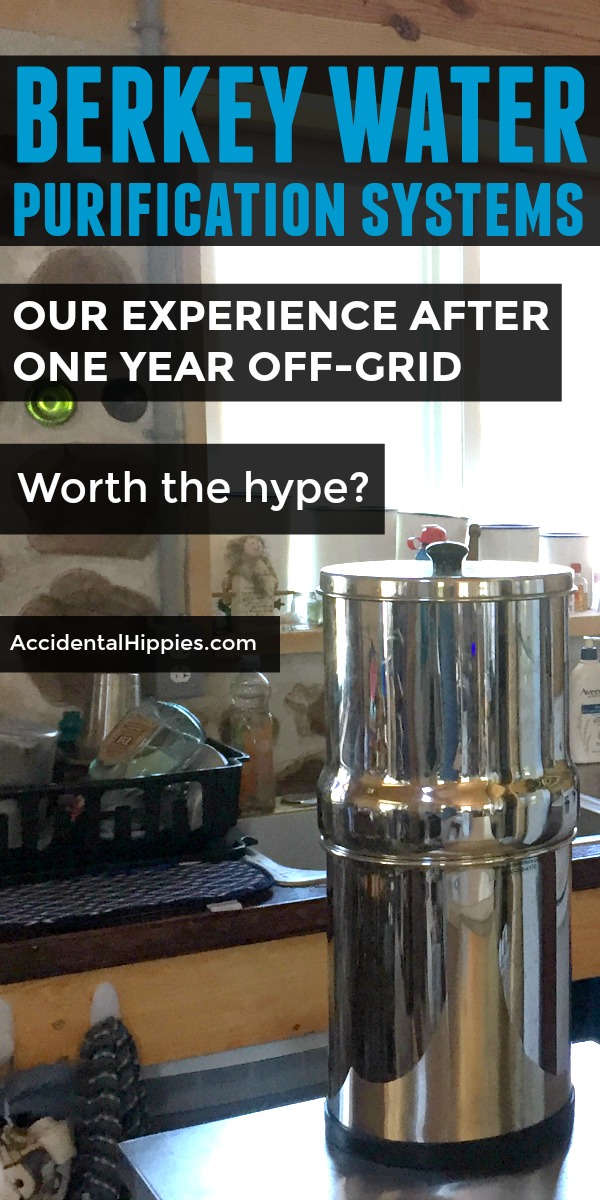
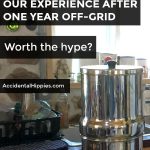
I was looking at the Berkey systems a couple of years ago (questionable city water) and will admit to some concerns about my well water. Did you do any testing of your cistern water? Or was it a no-brainer that you needed some kind of purification system and it was simply a question of which one?
I’ve been looking at various water test kits and ratings – a hot mess at best. It seems largely to boil down to (excuse the pun) you get what you pay for. Any opinion/thoughts?
Thanks
Teri
We picked up a water test from the hardware store but never sent it in. Looking at the water quality between what comes out of our tap and what we filter, it’s a pretty stark contrast. I’ve looked inside our gutters and have seen what our particulate filter looks like when we change it (both are pretty nasty), and since it only filters down to 10 microns I know there are other things that must be coming into the tap water that I would never want to drink. In that sense, it was a no-brainer for us to get a good water filter. I would love to test some “before and after” water samples somehow though. I’ve considered looking into state and local agencies that might do this, as well as university labs near us, but have never done it. The county health department would be the most logical place to start. I know there are also different at-home kits you can use but I have to wonder how much they detect or how accurately.
I can see your need for a filter was a no-brainer but the no-seeums require testing that was why I asked – I was looking at the home water tests on Amazon and while the overall ratings were good, most of the five-star reviews were happy about how quick shipping was. Not what I’m looking for. The reviews that actually talked about how well the test worked were mixed. Even the mail-in tests, people occasionally had issues with lab quality. I have looked at my local county/state testing (free!) but they only test for three or four things – I’d like something a bit more comprehensive. Maybe I’ll take a chance with one of the at-home tests. Or I’ve been drinking the well water for seven months now and I’m not dead yet so maybe it’s not necessary. One more thing to make myself crazy about – weeee!
thanks, Teri
I REALLY love what you’re doing to reduce waste and live off the grid, etc. It’s super inspiring for me, who’s living the regular kind of life but trying to do it in a more earth-friendly way.
Thanks for the review. Our current city water is somewhat drinkable some days, undrinkable others. We end up buying bottled water, a solution that doesn’t make us happy from the cost and waste standpoints. Pretty much goes against how we are trying to reorient our lives. I looked into a reverse osmosis system with UV sanitizer and filter to put minerals back into the water for ph balance and flavor. I’ve worked with RO systems in industry and know how much time and money we spent on flushing and changing filters. Besides, RO systems use about 75 gallons to get 50 gallons of filtered water.
For a 2 person, 2 dog, 2 cat family, looks like the Big Berkey would be a good solution for us. We would save the cost of the unit in just over a year by not buying bottled water.
I REALLY love what you’re doing to lessen squander and live off the lattice, and so forth. It’s overly moving for me, who’s carrying on with the customary sort of life however attempting to do it in a more earth-accommodating way.